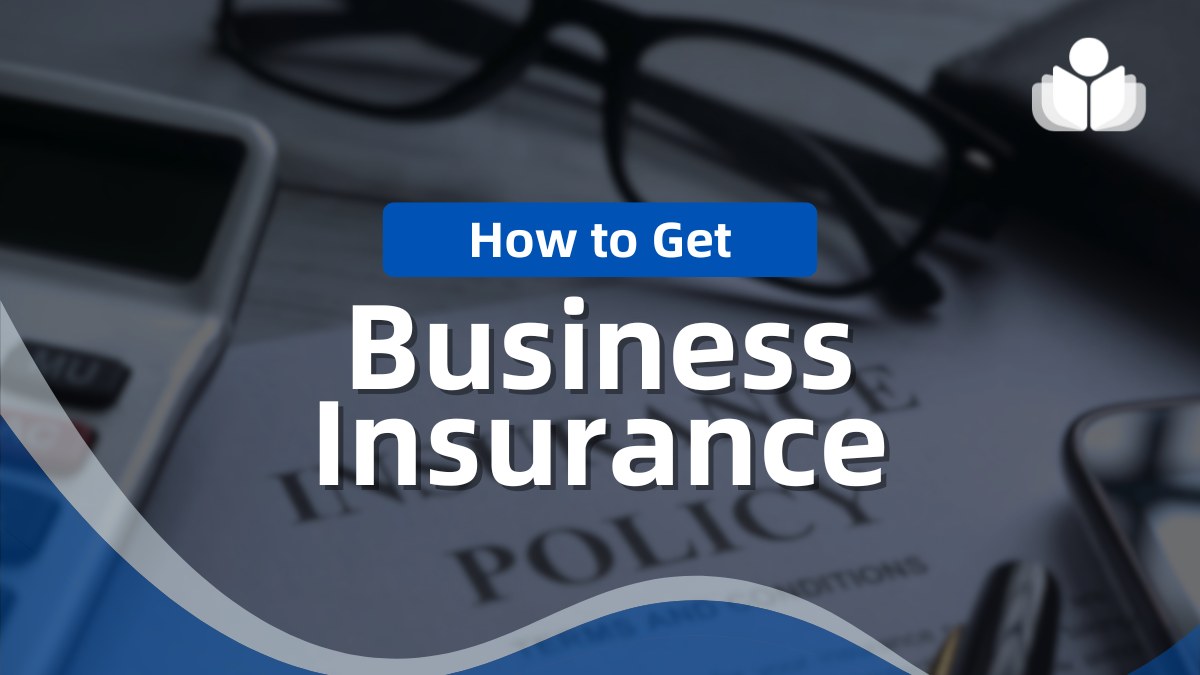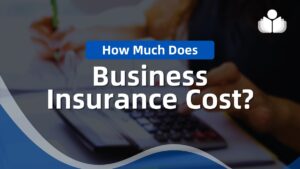Whether you run a physical store or operate as an online-based contractor, securing the right business insurance is crucial for safeguarding your operations against unforeseen events. With many insurance types and providers available, figuring out how to get the appropriate business insurance might seem daunting.
In this guide, I’ll simplify the process into six straightforward steps to help you insure your small business, from assessing your risks to selecting the most suitable policies for your needs.
>> Secure Your Future – Get Covered With NEXT! >>
How to Get Business Insurance in 6 Simple Steps
Buying insurance for a small business can feel overwhelming, particularly if you’re a new business owner. However, the process becomes much more manageable if you break it down into individual, clear steps:
- Understand how insurance can help
- Review different types of business insurance
- Assess business risk
- Get quotes from business insurance providers
- Review, customize, and purchase your policy
- Reassess your policy annually
1. Understand How Insurance Can Help
There’s a common misconception that small businesses don’t need insurance, but in reality, small business insurance is crucial and offers multiple benefits, including:
- Protecting Your Assets: This covers your equipment or building in case of theft or natural disasters.
- Financial Reimbursement: Insurance can compensate you for earnings lost due to unforeseen disruptions such as cyberattacks or burglaries.
- Protection from Lawsuits: It protects against liability claims for bodily injuries, such as slips and falls.
- Closing Coverage Loopholes: If you operate your business from home, homeowner’s insurance might not cover business-related properties or products in emergencies. A small business insurance policy can address these coverage gaps.
>> Buy NEXT’s Insurance Policy Online >>
2. Review Different Types of Business Insurance
Asking, “Do I need business insurance?” is an important first step for any business owner. Numerous types of business insurance are available, each designed to protect different aspects of your business.
Understanding these can help you select the best coverage for your needs. Here’s a rundown of some of the most common types of insurance that small businesses often choose:
- General Liability: This insurance provides coverage against lawsuits arising from bodily injuries, property damage, or personal injuries that occur on your business premises or as a result of your operations. For contractors, having this may be mandatory for working in certain industries.
- Commercial Auto: Commercial auto insurance is essential if your business uses vehicles. It covers your business if you or an employee is involved in an accident while driving a company vehicle.
- Workers’ Compensation: Workers’ compensation insurance is almost always required by law if you have employees. It provides benefits to employees who are injured on the job and unable to work.
- Cyber Liability Insurance: Data breach insurance protects your business in case of a data breach where sensitive information like client lists or banking records is compromised. It also covers legal fees if a customer sues you over a breach.
- Professional Liability: If you provide professional services, this insurance (Errors and Omissions or E&O insurance) covers you against lawsuits alleging errors, misconduct, or negligence.
- Business Interruption: This insurance helps cover lost income and other expenses if your business operations are halted due to an external event beyond your control.
- Commercial Property: Protects your physical business space and contents against damage from natural disasters, theft, and vandalism.
- Business Owner’s Policy (BOP): Often a cost-effective option, a BOP bundles commercial property, general liability, and business interruption insurance.
- Key Person Insurance: Covers pivotal personnel in your company. If a key individual dies, the insurance payout helps fund the search for a replacement and sustains business operations during the transition.
3. Assess Business Risk
Only some businesses require the same types of insurance. For example, if you’re a solo accountant working from home, professional liability insurance is essential to protect against claims of errors or negligence in your work.
However, since you don’t employ anyone else, you wouldn’t need workers’ compensation insurance. On the other hand, certain businesses inherently face more risks, which shapes the type of insurance they should consider.
Here are some factors to think about when determining the right insurance for your business:
- Digital Footprint: If your business operations rely heavily on digital platforms, consider the impact of potential cyber threats. Cyber insurance becomes valuable here, offering protection against the effects of a data breach or hacking incident that could disrupt your operations.
- Physical Workspace: If you have a physical location that the public or clients visit, general liability insurance is crucial. It covers claims related to bodily injuries or property damage from visitors on your premises.
- Regional Weather: Commercial property insurance is critical for businesses located in areas susceptible to natural disasters such as floods, hurricanes, or tornadoes. This type of insurance helps cover the cost of repairs or replacements for physical assets damaged during such events.
In general, you can think about:
- What kind of accidents might your business be prone to? For example, a brick-and-mortar store faces a higher risk of incidents like slip-and-fall accidents than a home-based business. This difference necessitates specific types of liability insurance to protect against potential claims.
- What kind of natural or unexpected disasters might affect your business? Consider the likelihood of natural disasters such as floods, earthquakes, fires, and hurricanes in your area. These events can cause significant damage to your physical assets and disrupt operations, highlighting the need for comprehensive property insurance.
- Who staffs your business? If you employ others, you are responsible for their safety and welfare while they are on the job. This responsibility makes workers’ compensation insurance essential to cover medical treatments, disability benefits, and lost wages for employees who suffer work-related injuries or illnesses.
- What kind of lawsuits could your business face? The nature of your business activities can influence the legal challenges you might encounter. For instance, if you manufacture products, you’re at a higher risk of lawsuits related to product defects. In this case, product liability insurance is crucial to protect against claims of harm caused by your products.
4. Get Quotes from Business Insurance Providers
You can work with a broker or contact an insurance provider directly when gathering insurance quotes.
Going directly to an insurance provider rather than using a broker has several advantages, such as direct communication with the insurer, the potential for cost savings by avoiding broker fees, access to exclusive discounts, a more straightforward selection process, increased control over purchasing decisions, exposure to a broader range of products, a simpler claims process, and more transparency about policy details.
However, working with a broker can also be advantageous, particularly for those with complex insurance needs or who value expert guidance.
>> Secure Your Future – Get Covered With NEXT! >>
Best Insurance Providers
NEXT’s general liability insurance premium provides unique, cost-effective solutions to damage claims quickly. Typically, an insurance adjuster reviews the damages and decides within two days of filing the complaint.
By providing details about your LLC to NEXT, the company can quickly identify the appropriate policies for your needs and offer you a quote in minutes. You can complete the purchase online. However, you can still contact an insurance agent if you require assistance. You also can access and share your certificate of insurance online as needed.
Read more: NEXT Business Insurance Review
Hiscox is highly regarded for its competitive pricing and comprehensive coverage, particularly noted for its cost-effectiveness. The company offers affordable premiums that fit your budget, enabling you to allocate resources wisely while securing the necessary coverage.
Their general liability insurance policies protect against bodily injury, property damage, and personal injury claims, making Hiscox a solid choice for those seeking robust insurance solutions.
Hartford is recognized as a trustworthy business insurance provider, delivering comprehensive coverage suited for businesses ranging from small to large. They facilitate easy management of insurance needs through their user-friendly online portal, where policyholders can swiftly obtain quotes, adjust policies, request certificates of insurance, and monitor claims.
Additionally, Hartford enables the convenience of online claim filing, even without an account. Small businesses can begin the quote process online, but completing the application may need the help of an agent.
Hartford’s website provides several methods to initiate service, including direct contact, an online contact form, or a connection with a local independent agent.
5. Review, Customize, and Purchase Your Policy
Whether you obtain insurance quotes through a broker or directly from providers, your next step is to compare these quotes to determine which policies and providers are best suited for your business.
This step is crucial in learning how to get business insurance. Review each quote thoroughly, ask questions, and possibly consult with your business advisors for their insights. Given that insurance policies can be complex, as you compare different quotes, here are several key points to consider:
- Coverage of Policy: It’s crucial to understand precisely what your policy covers and excludes. You should read the fine print and discuss any questions with a representative or your broker. For example, if you’re considering commercial property insurance, determine which types of disasters are covered, such as whether the policy includes flood coverage, as this is only standard in some policies.
- Limits of Liability: These limits define the maximum amount an insurer will pay under a policy. For instance, a common limit for a general liability policy might be $1 million per occurrence and $2 million aggregate per year. Understand that higher limits generally increase the cost of the policy.
- Premium and Deductible: The premium is what you pay annually or monthly for your policy, and it varies based on the extent of coverage and the policy limits. The deductible, however, is the out-of-pocket amount before your insurance begins to pay on a claim. Higher deductibles can lower your premium costs.
- Payment Terms: It’s important to know how you’re billed (either by the broker or directly by the carrier) and whether payments are due upfront or can be made in installments to manage your business’s cash flow. Also, confirm whether you’ll be billed annually, monthly, or elsewhere.
- Carrier Rating: Check the insurance carrier’s financial stability and reputation by looking at their A.M. Best Rating, which assesses financial strength and operating performance. Carriers rated “A-” or better are generally considered reliable and strong financially.
Understanding these aspects will help you choose a policy that provides the necessary coverage, fits within your budget, and meets your business’s specific needs.
6. Reassess Your Policy Annually
Once you’ve selected and purchased your insurance policy, it’s important to understand the logistics of managing it. Ensure you know when payments are due, how to file a claim, and how to contact customer service for assistance.
Fortunately, many insurance providers offer online customer portals where you can handle various tasks, including making payments, filing claims, contacting support, adding additional insureds, or requesting a certificate of insurance.
However, it’s crucial not to purchase a policy and simply ignore it. Regularly review your coverage to ensure it meets your business needs, especially as it grows or changes.
This proactive approach allows you to adjust or update your coverage as necessary, ensuring your business remains well-protected against evolving risks.
When to reevaluate your coverage
A wise strategy is to reevaluate your insurance coverage annually when your policy is up for renewal. This timing allows you to assess any changes in your business and potential risks to decide whether to renew your current policy, make adjustments, or even switch providers.
In addition to these annual reviews, it’s important to revisit your coverage whenever significant changes occur in your business. For instance, hiring your first employee would typically require you to add workers’ compensation insurance.
Similarly, purchasing new real estate might necessitate updating or expanding your commercial property insurance. Keeping your coverage aligned with your business’s current needs ensures you are adequately protected against risks as your business evolves.
>> Ensure Your Business’s Future With NEXT >>
How to Get Business Insurance FAQs
>> Explore NEXT Solutions for Comprehensive Coverage >>
The Bottom Line – How to Get Business Insurance
Your insurance policy is designed to protect your business, so as your business evolves, your coverage should adapt accordingly. Suppose you must modify or adjust your policy and are still determining the necessary changes.
In that case, it’s a good idea to contact your broker or a representative from your insurance company. They can help you explore different coverage options and ensure that your insurance meets the current needs of your business.
 Sections of this topic
Sections of this topic



















